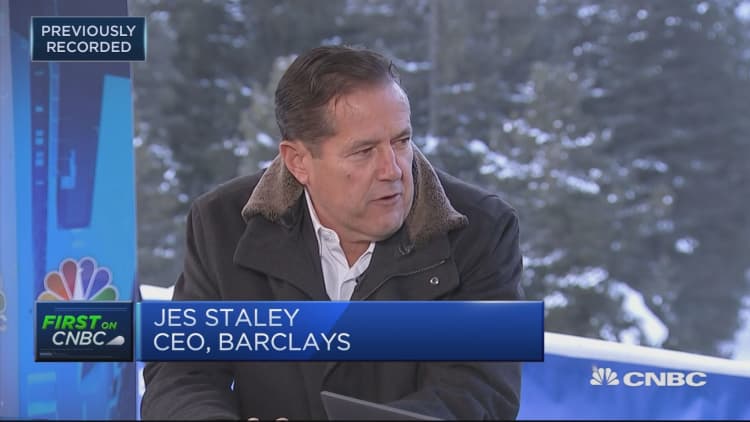
The potential for governments to deploy fiscal stimulus policies in 2020 is creating greater optimism at this year's World Economic Forum in Davos than a year ago, according to Barclays CEO Jes Staley.
With the European Central Bank (ECB) cutting interest rates to a record low -0.5% last year, new ECB President Christine Lagarde has joined her predecessor Mario Draghi's calls for governments with fiscal headroom, such as Germany and the Netherlands, to start fiscal spending programs in order to boost the ailing euro zone economy.
The U.S. Federal Reserve cut rates three times in 2019 as central banks around the world shifted toward more accommodative monetary policies.
"The U.S. is taking that and driving a fiscal stimulus policy, and I think you will start to see other countries like the U.K. begin to do that, and that's providing a certain floor to the economy which is lending itself to more optimism in Davos this year than last year," Staley told CNBC on Wednesday.
With markets now beginning to price in a cut by the Bank of England this year, Staley predicted that the British government will look to embark on a broad fiscal spending program to invest in regional infrastructure, since the impact of looser monetary policy on the global economy is diminishing as rates worldwide move closer to negative.
He suggested that the ECB and other central banks in Europe should begin looking at scaling back negative rates, which place a squeeze on the profitability of banks by effectively charging them for deposits placed with the central bank.
"There was a financial crisis of great proportion 10 years ago, the banks had a lot to do with it, and I think the central banks are more focused on stability in the economies right now than the banks," Staley told CNBC's Geoff Cutmore and Steve Sedgwick.
"They should start thinking now about the profitability of banks, much like you see in the U.S. If you dropped the European banking industry into the U.S. interest rate environment, you'd see quite an uptick in profitability."
This sentiment was echoed by ING CEO Ralph Hamers, who suggested that as a politician rather than a central banker, Lagarde might be able to convince European governments to open the fiscal taps.
"There is absolutely no impact of further easing any more, we don't see that - actually it is detrimental. It is detrimental to the confidence of the consumers, it is detrimental to the banks' profits that actually have to support economic growth, so now the pressure is going to have to go back on the politicians for reform and fiscal easing - it has got to happen," Hamers told CNBC.
He highlighted that large scale infrastructure projects and the transition toward green energy are not only necessary financing requirements for governments, but also a "massive opportunity" to develop new technology and invest in renewables.





